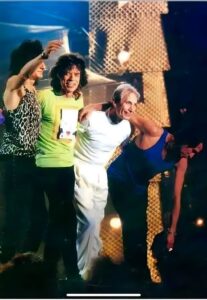
Robert Plant Passed on a White-Collar Career to Sing for Led Zeppelin.
In the sprawling narrative of rock history, few stories are as compelling—or as pivotal—as the moment Robert Plant chose the uncertain path of music over the stable promise of a white-collar career. That decision, seemingly reckless at the time, would alter the course of music forever, giving rise to one of the greatest voices in rock and the frontman of one of the most legendary bands in history: Led Zeppelin.
Plant’s journey to stardom is not simply a tale of talent meeting opportunity; it is also a study in risk, rebellion, and vision. At a time when societal expectations pushed young men toward secure office jobs, respectable paychecks, and linear careers, Plant tore up the script. Instead of a desk, he chose a microphone. Instead of board meetings, he embraced roaring stadiums. And instead of conformity, he delivered unrestrained art. His choice didn’t just change his life—it changed the entire landscape of rock music.
Early Life and the Fork in the Road
Robert Plant was born in West Bromwich, Staffordshire, in 1948, into a working-class English family. Like many of his generation, he grew up in the shadow of post-war austerity, when the British economy was rebuilding, and conventional careers were prized as the safest route to security. His father envisioned a white-collar life for Robert, with steady work in an office or in business administration. It was the kind of path that promised stability and respectability—a sharp contrast to the uncertainty of creative pursuits.
Plant, however, had been bitten early by the blues bug. Drawn to American bluesmen like Howlin’ Wolf, Robert Johnson, and Muddy Waters, he spent his teenage years obsessed with music, sneaking into clubs, and performing with small local groups. By his late teens, he was fronting bands such as The Crawling King Snakes and Band of Joy, honing his raw, untamed style that blended blues authenticity with an almost spiritual intensity.
The crossroads came when Plant was faced with the option of pursuing the safer route—a career behind a desk—or continuing to chase music, a choice with little guarantee of success. At that time, the British music industry was competitive and unstable. Many aspiring musicians fizzled out before they even found their footing. Friends, mentors, and even family members warned him about the risks. But Plant, driven by an unshakable belief in his voice and his calling, refused to settle for what he considered a dull, predictable life.
The Leap into the Unknown
Walking away from the conventional path was no small gamble. Plant’s early musical years were marked by financial struggle and uncertainty. He had stints working odd jobs, from laying tarmac to working in construction, all the while pouring his energy into his bands at night. The thought of a nine-to-five job never appealed to him, not when the blues, the stage, and the possibility of artistic expression were calling.
It was during one of these uncertain stretches that fate intervened. Guitarist Jimmy Page, on the hunt for a new vocalist to front a band he was forming in 1968, came across Plant. Page was immediately struck by his voice—its power, range, and primal energy. But Plant was more than just a singer. He carried with him a rebellious spirit, an aura that embodied what rock could be: dangerous, free, and transformative.
Page invited him to join what would become Led Zeppelin. And with that, the trajectory of Plant’s life—and rock history—changed forever.
From Office Desk to Rock’s Biggest Stages
Had Plant chosen the white-collar route, the world would never have experienced the magic of Led Zeppelin. Instead, by embracing risk, he became the band’s fiery frontman, bringing to life songs that fused blues, folk, hard rock, and mysticism. His soaring vocals defined classics like Stairway to Heaven, Whole Lotta Love, and Immigrant Song. His lyrical contributions, often inspired by mythology, history, and personal experience, added layers of depth to the music.
Plant’s stage presence was equally revolutionary. He didn’t just sing; he embodied the music. With his golden mane of hair, bare-chested bravado, and serpentine movements, Plant exuded raw sexuality and charisma, transforming concerts into experiences of near-spiritual release. Critics and fans alike noted how he shattered the mold of what a frontman could be, creating a template followed by countless rock singers after him.
The stability of a white-collar job could never have provided the kind of fulfillment or cultural impact that Plant found through Zeppelin. Instead of office paperwork, he was penning lyrics that spoke to rebellion and transcendence. Instead of a paycheck, he earned immortality.
Impact Beyond the Band
Led Zeppelin went on to become one of the most influential rock bands in history, selling over 300 million records worldwide. But Plant’s decision to follow his passion extended beyond commercial success. He became a symbol of artistic authenticity, a reminder that following one’s calling—no matter how risky—can yield world-changing results.
Even after Led Zeppelin disbanded following the tragic death of drummer John Bonham in 1980, Plant refused to take the easy road. While he could have rested on past glories, he pursued solo projects, experimented with different genres, and collaborated with artists across musical landscapes, from Alison Krauss in Americana to various world music ventures. His willingness to evolve, rather than settle, mirrored the same boldness that had led him to reject the office life decades earlier.
Plant’s solo work, particularly albums like Raising Sand with Krauss, earned him critical acclaim and Grammys, proving that his artistry wasn’t confined to Zeppelin. His refusal to conform, his hunger to explore, and his commitment to music as an evolving craft all stem from that foundational choice: art over security, music over monotony.
A Broader Symbol for Dreamers
Robert Plant’s decision resonates far beyond music. His story is a reminder for anyone standing at a crossroads, weighing passion against practicality. While not everyone will become a rock icon, Plant’s journey demonstrates that true fulfillment often comes from daring to defy convention.
In a modern context, where many young people face similar pressures to pursue “safe” careers, Plant’s story serves as both inspiration and challenge. It underscores that risk and uncertainty are often part of the creative process, and that greatness is rarely achieved by playing it safe.
Moreover, his life highlights the transformative power of music itself. Plant didn’t just avoid a desk job; he created an artistic legacy that continues to inspire generations. His voice remains one of rock’s most distinctive instruments, and his influence can be heard in singers from Freddie Mercury to Chris Cornell, from Axl Rose to Jack White.
The Road Not Taken
Speculating about what might have happened had Plant chosen a white-collar career is almost unthinkable. Perhaps he would have lived a comfortable, predictable life, working in an office, raising a family, and enjoying the quiet satisfaction of stability. But the world would have been deprived of the golden roar that became the soundtrack to a generation.
Led Zeppelin’s iconic moments—the opening wail of Immigrant Song, the haunting build of Stairway to Heaven, the swagger of Black Dog—all exist because Plant refused to settle. His decision is proof that sometimes, the road not taken is the only road worth traveling.
Conclusion
Robert Plant’s story is not just about music—it is about courage. In rejecting the stability of a white-collar career, he embraced uncertainty and carved out a place among the immortals of rock. His journey stands as a testament to what can happen when talent, vision, and risk converge.
Plant’s legacy is not only the catalog of Led Zeppelin or his acclaimed solo work—it is the example he set. By daring to live authentically, he proved that passion, no matter how impractical it may seem at first, has the power to redefine history.
When the world hears Robert Plant’s voice, it hears more than music. It hears the sound of a man who said no to conformity and yes to destiny.


